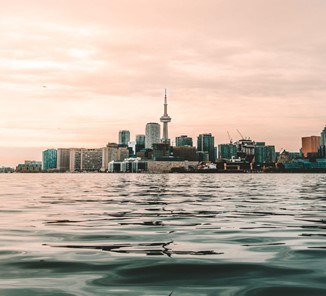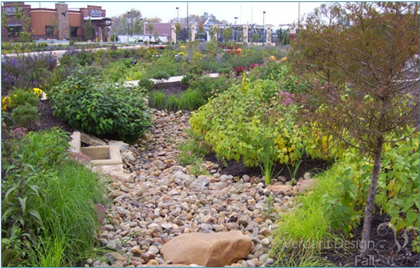NALMS Releases a Position Statement and Policy Recommendations on Nature-based Solutions in Urban Lakes and Watersheds
By Gabriella Placido, NALMS Policy Intern
Read the position statement and white paper hereDespite being just over halfway through the year, 2021 has already broken an assortment of records with its extreme weather and unprecedented circumstances. Intense storms, heat waves, fires, floods, droughts, and a series of harmful algal blooms have plagued North America and the rest of the world, all while trying to overcome a persistent and troublesome pandemic. Such notable and problematic effects of climate change are increasing in intensity and frequency around the globe; the climate crisis can be ignored no longer.

Urban lakes such as Lake Ontario in Toronto, Canada are subject to heavy human use and stressors, and therefore need increased attention to maintain water quality and health. Photo courtesy of Jason Swaby.
It is increasingly being realized that answers to solving many of these environmental and societal issues lie in nature. Nature-based solutions (NbS) can serve as an important tool in significantly addressing and mitigating many of these concerns, while simultaneously yielding many other valuable benefits (Ossola & Lin, 2021). NbS are approaches that work with nature instead of against it to tackle a variety of societal challenges such as climate change, water and food security, biodiversity protection, human health, and disaster risk management. NbS can address many of these staggering threats that urban lakes face, helping to secure the benefits they provide while also yielding others. NbS can help improve the overall human and environmental health of some of the most densely populated urban and suburban lakes and watersheds.
NALMS has just released a position statement and official policy recommendations on NbS in urban lakes and watersheds. The paper explains the benefits of NbS; addresses NbS that can improve urban stormwater runoff; describes NbS that can help prevent floods, droughts, and heat waves; provides important economic considerations ; describes the role of NbS in building climate resiliency; makes a statement about environmental justice; contains legislative recommendations; and includes many other present-day suggestions for NbS implementation going forward from the scientific literature.
Urban lakes and watersheds, along with other freshwater ecosystems around the world, are often struck the hardest from human impacts in comparison to other systems. With a third of freshwater fish species at risk of extinction, this is becoming known as an invisible tragedy, hidden under the surface of the water and oftentimes difficult to detect (Reid et al. 2018). Urban lakes are also subject to the heaviest use and the most harmful human impacts. Combined with being shallower and utilized more intensely, urban lakes are often more vulnerable and degraded than rural and non-urban lakes (Costadone, 2021). Urban lakes suffer direct impacts from human use such as pollution and contamination, invasive species, habitat degradation, unsustainable use, dams and other unnatural modifications to flow, and high sensitivity to climate change effects (Reid et al. 2018).

The Old Brownsboro Crossing Low-Impact Development Plaza in Louisville, KY. This NbS encompasses eight lots in this 100 acre marketplace to improve stormwater runoff by allowing for significantly more infiltration. This reduces stormwater runoff volume, reducing flood risk and improving water quality by allowing plants to absorb and treat it rather than send it directly to nearby water bodies. Source: American Society of Landscape Architects.
Cumulatively, these disturbances are taking their toll on urban lakes, affecting the services they provide to cities and regions, which include a wide range of environmental, economic, recreational, aesthetic, cultural, and other social benefits (Schallenberg et al. 2013). Additionally, the effects of climate change impact those who live in urban areas most heavily (Kabisch et al. 2017).
NALMS has also collaborated with other Aquatic Science Societies on a letter to Congressional Leadership, cited in the white paper, urging immediate legislative action and significant reductions of greenhouse gas emissions. The landmark Intergovernmental Panel on Climate Change (IPCC) report released this month (2021) echoes similar sentiments, emphasizing the importance of drastically reducing greenhouse gas emissions and explaining that it is the crucial action to take to avoid the most catastrophic effects of climate change. The significant environmental, economic, and societal costs of neglecting environmental needs and taking a “business as usual” approach towards climate change are increasingly being observed, especially considering challenges like biodiversity loss, food and water insecurity, declining water quality, worsening natural hazards and disasters, and ecosystem collapse (Seddon et al. 2020).

A NbS project to reduce streambank erosion in the Currys Fork Watershed of northern Kentucky. Live stakes are planted along degraded streambanks, which are branches cut from native trees commonly found along streams, including dogwoods and willows. Live stakes are low-cost, low-risk, and involve the community by serving as volunteer planting events. Image by Becca Trueman, Currys Fork Watershed Coordinator.
The time is now for urgent and immediate action on human-caused climate change; the wicked problems plaguing urban lakes, watersheds, aquatic resources, and society as a whole are only worsening (American Fisheries Society, 2020; IPCC, 2021). There must be a shift from short-sighted goals to longer-term thinking and planning that accommodates the current impacts of climate change and those that will occur in the near and long-term future. NbS can be a meaningful part of this transition while also bringing along many other favorable societal and economic benefits, including resilience to extreme storms and natural hazards, improved water quality and quantity, increased food security, improved air quality, increased recreational space, energy conservation, maintenance cost savings, and much more.
Read the white paper here for a complete explanation and for policy recommendations going forward. Also, check out the Kentucky Association of Mitigation Managers’ nature-based watershed solution storymap here.
References
- American Fisheries Society. (2020). Statement from world aquatic scientific societies on the need to take urgent action against human-caused climate change, based on scientific evidence. African Journal of Aquatic Science, 45(4), 383–385. https://doi.org/10.2989/16085914.2020.1824388
- American Fisheries Society. (2021, March 24). Conservation and Outdoor Groups Call for Nature-Based Climate Solutions – Climate Change and Fisheries. Climate.fisheries.org. https://climate.fisheries.org/conservation-and-outdoor-groups-call-for-nature-based-climate-solutions/
- American Fisheries Society, Association for the Sciences of Limnologists and Oceanographers, Coastal and Estuarine Research Federation, North American Lake Management Society, Phycological Society of America, Society for Freshwater Science, Society of Wetland Scientists. (2021, July 26). Aquatic Science Society Letter to Congressional Leadership.
- Costadone, L. (2021). Urban Lakes: Ecosystem Services and Management. Dissertations and Theses. Paper 5699. https://pdxscholar.library.pdx.edu/open_access_etds/5699/
- Intergovernmental Panel on Climate Change, 2021: Climate Change 2021: The Physical Science Basis. Contribution of Working Group I to the Sixth Assessment Report of the Intergovernmental Panel on Climate Change [Masson-Delmotte, V., P. Zhai, A. Pirani, S. L. Connors, C. Péan, S. Berger, N. Caud, Y. Chen, L. Goldfarb, M. I. Gomis, M. Huang, K. Leitzell, E. Lonnoy, J. B. R. Matthews, T. K. Maycock, T. Waterfield, O. Yelekçi, R. Yu and B. Zhou (eds.)]. Cambridge University Press. In Press.
- Kabisch, N., Korn, H., Stadler, J., & Bonn, A. (2017). Nature-based solutions to climate change adaptation in urban areas: Linkages between science, policy and practice. Springer Nature.
- Leibman, H., & Kentucky Association of Mitigation Managers. (2021). Nature-based Watershed Solutions in Kentucky. https://www.arcgis.com/apps/Shortlist/index.html?appid=bd78c93f73964c5298ff0dc9af28e008
- Ossola, A., & Lin, B. B. (2021). Making nature-based solutions climate-ready for the 50° C world. Environmental Science & Policy, 123, 151-159.
- Reid, A. J., Carlson, A. K., Creed, I. F., Eliason, E. J., Gell, P. A., Johnson, P. T., … & Cooke, S. J. (2019). Emerging threats and persistent conservation challenges for freshwater biodiversity. Biological Reviews, 94(3), 849-873.

